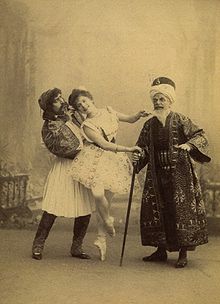Le Corsaire (ballet)
Le Corsaire is a ballet whose libretto Jules-Henri Vernoy de Saint-Georges freely based on the poem The Corsair by George Gordon Byron .
The choreographies presented today are or are based on Marius Petipa's version of the work with music by Adolphe Adam and Léon Minkus . Petipa presented several versions of the ballet in the second half of the 19th century, to which he kept adding new parts.
action
The place of the action is on the coast of the Ionian Sea at a time when Greece was occupied by the Turks.
Prologue: Shipwreck
The pirates, led by Conrad, Ali and Birbanto, are surprised by a storm at sea and hold on to the sinking ship.
I. act:
Conrad and his friends are washed ashore, drag themselves into hiding and only narrowly escape the criminal slave trader Lankedem, who is after human prey. He suspects that he will soon make a discovery and goes to hire other conspirators to help. Young Greek women emerge delighted to be free. Led by Medora and Gulnara, they discover the shipwrecked pirates, and Medora and Conrad immediately fall in love. But soon the women feel the emerging danger and are pushing the men back into their hiding place when a Turkish patrol approaches. The Turks work hand in hand with Lankedem and receive a generous reward for capturing the women who are then taken away. The pirates come out of their hiding place and swear to save them.
In the midst of all the hustle and bustle and bartering on the slave market, the rich Seid Pascha appears. Lankedem presents him with the 'fruits' of his travels in foreign countries, and although he praises the beauty of the captured women from Palestine and Algeria, the Pasha has no interest in them. Then Lankedem presents Gulnara, and the Pasha is enthusiastic about her. He pays a generous sum and has it brought to his harem. But Lankedem has saved his greatest triumph for last; when the Pasha sees Medora, his enthusiasm is even greater. As he makes his bid, an unknown dealer shows up and bids against him. It is Conrad in disguise who wins Medora and quickly carries away, followed by the other women captured. Before the Turkish guards arrive, Conrad's men capture Lankedem; the pasha's anger at the lost newest pearl of his harem is great.
Act II: the cave of the pirates
Conrad and his men return to their cave in high spirits at their prank; not only did they win back women, but they also stole treasures. At the height of the festival, Conrad and Medora confess their love to each other, and Ali declares himself Medora's devoted slave. The women ask Medora to negotiate with Conrad about her release. Conrad then promises them their freedom, but Birbanto and his friends protest, and a fight breaks out. However, Conrad keeps his word and lets the women go free.
Lankedem, a prisoner who witnessed this conflict, makes a deal with Birbanto and his pack. In return for his freedom, he tells them that a certain drink, dripped on a flower, induces deep sleep immediately, and that this knowledge could be very useful. Conrad and Medora return from the party and enjoy the opportunity to be together for a while. Birbanto waves to Medora and suggests giving Conrad a bouquet as a token of gratitude for the release of her companions. Conrad smells the flowers and immediately falls into a deep sleep. When a group of pirates surround the fearful Medora, Lankedem seizes the opportunity to kidnap her for the second time. Conrad wakes up and again he and Ali vow to free Medora.
III. Act: Be Pasha's harem
Gulnara, who is adored and admired by the Pasha, enjoys a good life, since no other woman is so valued by him. Lankedem brings three odalisques who entertain the pasha and his harem with a dance. Then Lankedem brings his greatest treasure, Medora. Again the Pasha is fascinated by her. Medora's grief over the separation from Conrad is alleviated by the reunion with Gulnara. More women come to keep Medora and Gulnara company at Le Jardin animé. Fountains splash and blossoms transform into beautiful women in this fantasy sequence. Medora dances with the flowers, Gulnara and Medora celebrate grace, harmony and femininity with the flowers.
The pasha is just about to finally close the deal (purchase of Medora) with Lankedem when two of his people warn him that a mysterious group of pilgrims is approaching the harem. The arrival of the pilgrims coincides with the evening prayer and their guide takes the lead. It's Conrad, of course, this time in a different disguise, and soon afterwards he's reunited with Medora and Gulnara. His men take revenge on the Pasha and his people, and shortly before they leave the place they take Lankedem prisoner and relieve him of his booty.
Epilogue:
Undaunted, Conrad, Medora, Ali and Gulnara set sail again in search of new adventures, this time making sure that luck is with them.
Famous passages
Some parts of the work are particularly well-known and are often performed in ballet evenings or competitions, including the “slave dance” ( Pas d'Esclave ) from Act 1 or “The Living Garden” ( Le jardin animé ) from Act 3 .
The most famous excerpt is probably the Grand Pas de deux from Act 2, in which the slave Ali dances with Medora. In the context of the piece it is a pas de trois (dance for three), since Conrad also takes part in the dance.
Photographs
Pierina Legnani and Olga Preobrazhenskaya in the scene The Living Garden
Lev Ivanovich Ivanov as Konrad in Le Corsaire
Marie Petipa and Sergei Legat (1900)



